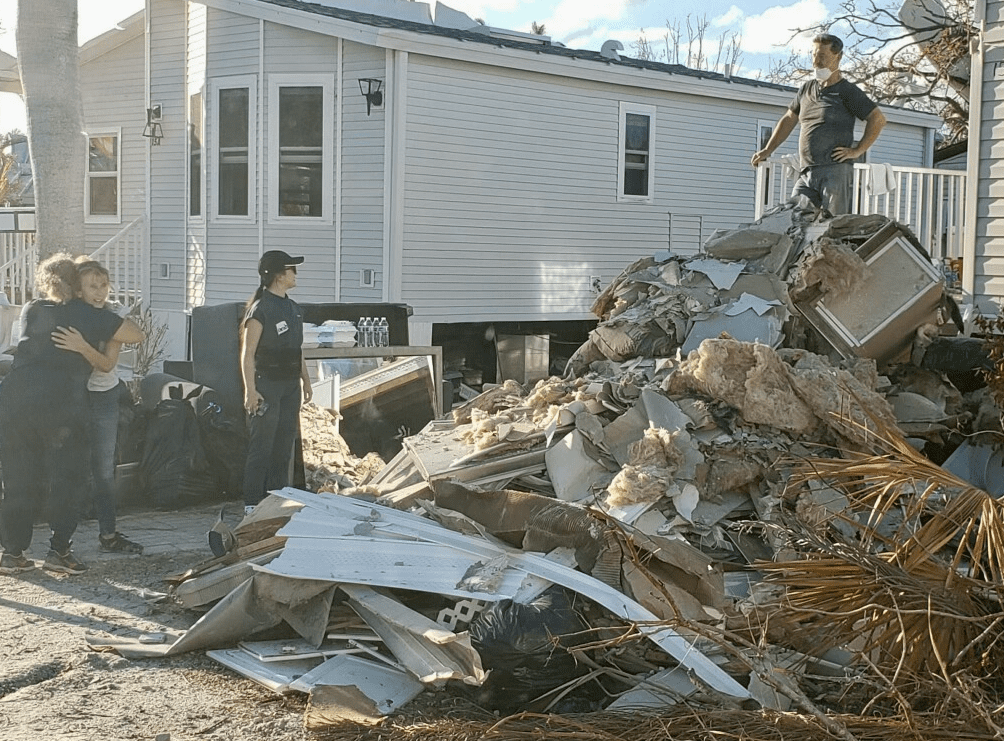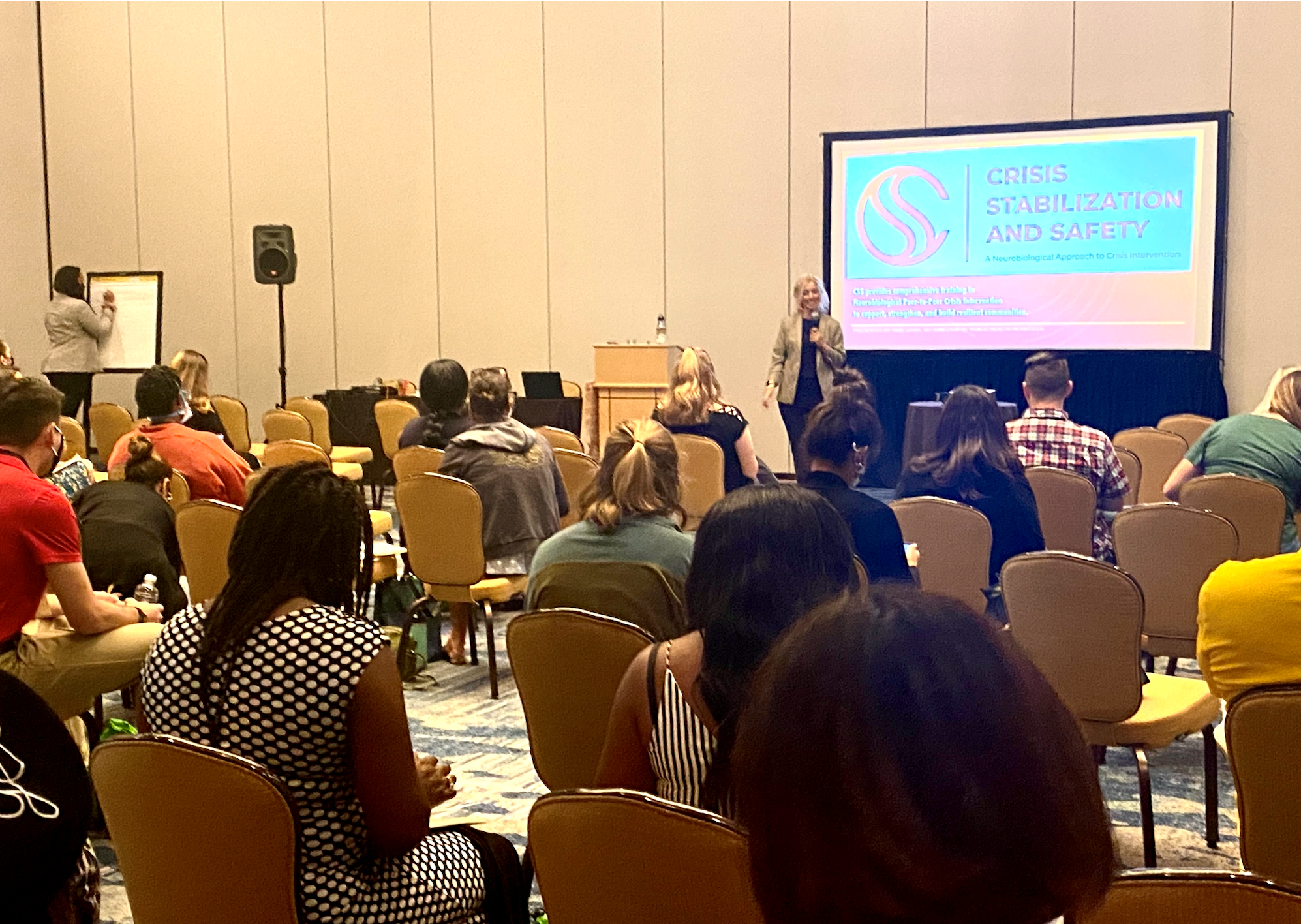Crisis Stabilization and Safety (CSS) is designed to improve team safety and reduce the potential for post-traumatic stress.
The CSS training program is designed to teach responders of all kinds to interrupt and prevent the symptoms of stress, shock, and trauma during a community-wide crisis, such as a disaster, mass casualty event, war, or pandemic. It equips individuals and peer teams with the tools and skills to create structured experiences of stability, safety, and support for themselves and others, even and especially when the stakes are high. By providing tools and skills to stabilize the nervous system, it improves short- and long-term outcomes for responders, their team, and the community they serve.
RESTORING THE BRAIN BODY CONNECTION
CSS is a science-backed curriculum developed by a team of experts with decades of experience in crisis response and neurophysiology. Research shows that what happens in a body during a crisis response can supersede the psychological impacts, so it makes sense to start by stabilizing and resetting the body. By working with the activation and agitation that may be presenting, it's possible to access internal safety and settle feelings of panic or upset.
Many professions experience situations with a potential for traumatic impact and could benefit from the CSS training program.

the future of trauma-informed crisis response
Crisis impacts us all, as individuals and communities. The prevalence of traumatic events such as natural disasters or mass shootings, unfortunately continues to rise. In 2021 alone, the US experienced 20 separate billion-dollar weather and climate disasters (climate.gov). In addition to injury and death, they often result in extreme emotional distress and financial ruin. Trauma-informed crisis response promotes safety, resiliency, and recovery. Regardless of the crisis, the need for responders to be equipped to manage themselves and support others in high stress situations is clear.
CSS is uniquely designed to meet this need.
WHAT'S IN THE TRAINING?
In response to the global need for effective crisis intervention, Somatic Experiencing International (SEI) has collaborated with neuroscientists, psychologists, crisis counselors, and emergency responders to develop a crisis intervention framework rooted in SE™ principles and adapted for high-stress settings.
CSS interventions are designed to stabilize the nervous system and reduce the immediate physiological stress response. The tools and training equip responders and other professionals with emotional, cognitive, and relational recovery strategies for the self and others. These highly effective peer-to-peer support protocols improve team safety and stability and reduce the potential for post-traumatic stress.
Law enforcement, firefighters, EMTs, dispatch/911, medical workers, victim advocates, and other professionals working with populations in crisis will gain valuable skills and insight with immediate opportunities for application through the CSS training program.
WE SPECIALIZE IN PEER SUPPORT
CSS is a somatic-informed, body-based peer support training program. Trainings are provided by skilled trainers that share your team's professional background. They understand your experience and situations you face in the field. There are thousands of peer support trainings to choose from, but CSS will get you out of your head and into your body–where the action is.
- Somatic, or body-based, interventions are more effective, more quickly in crisis situations
- Focusing on the nervous system instead of traditional mental health protocols limits potential re-traumatization of survivors
- Responders already trained in CISM, CIT, PFA, MHFA and other crisis intervention models will benefit from expanded understanding of the neuroscience and add important skills and tools to their peer support toolbox
PILOT PROGRAMS
CSS has been presented to the United Nations NGO Committee on Mental Health, nurses in San Diego, teachers in New York, crisis responders from Boulder’s mass casualty incident, and law enforcement and firefighters in Florida and Idaho, among others. Five formal pilots were completed, including:
- Voluntary Organizations Active in Disaster (VOADs) responding to the Marshall Fire in Boulder, CO
- Pueblo of Pojoaque Community Health Representatives and Behavioral Health Department
- Mobile mental health team responding to Hurricane Ida in the Louisiana Bayou
- Philadelphia Keystone Crisis Intervention Team
- Jicarilla Apache Nation Community Health Representatives

OUTCOMES
- 93% of participants surveyed report that the CSS training provided resources useful to their profession
- 97% of participants surveyed report that the CSS training provided tools that will help them handle crisis situations
- Participants report deepened skills and knowledge:
“The sessions provided a practical approach to working with personal and collective trauma to help yourself but also to help your community.”
“These sessions provided a framework for understanding how trauma impacts the brain and the body and all the layers of personal and community impact.”
CRISIS STABILIZATION AND SAFETY TRAINING
CSS BASICS
$125
- One online video session
- 1.5 – 2 hours
- Intended for the general public
- Teaches basic crisis intervention and traumatic impact support
CSS FIRST AID
$299
- Delivered live in-person or online, over one or two sessions
- 6 – 8 hours
- Intended for professionals interested in earning a certificate and acquiring intermediate crisis intervention and traumatic impact knowledge and skills
- Teaches basic neurobiology, crisis intervention, stabilization tools and techniques, traumatic impact support, and is tailored to participants’ profession when possible
- Participants receive a certificate of completion
CSS PEER SUPPORT
$990
- Delivered in-person over 3 – 4 days
- Intended for professionals interested in acquiring advanced crisis intervention and traumatic impact knowledge and skills, and developing peer support skills
- Teaches all of the content in the CSS FIRST AID program at an advanced level, as well as deeper exploration of the science and application of tools and techniques in support of others
- Participants receive a certificate of completion
READY TO SIGN UP?
We are excited to offer several upcoming trainings virtually and across the US. View the options below to find the CSS training that's right for you!
Online CSS Basics
2026 DATES COMING SOON
Online CSS First Aid
2026 DATES COMING SOON
In-Person CSS Peer Support
2026 DATES COMING SOON
GIVE TO THE CSS SCHOLARSHIP FUND
In times of crisis, the first step to trauma resolution is safety. By equipping first responders with the tools they need to stabilize crisis victims and protect their own mental health, communities can find healing, restoration, and resilience. Caring people like you can prevent secondary trauma and burnout in helping professions, create support networks of healing professionals, and help communities thrive after crisis.
Give the gift of SE-informed tools and resources for frontline professionals through the CSS Scholarship Fund!

